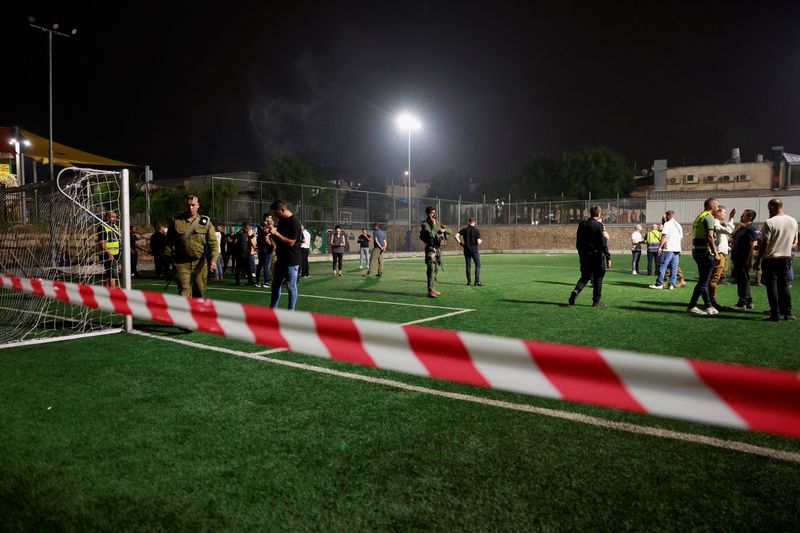Israel says Hezbollah rocket kills 11 at football ground, vows response
2024.07.27 16:10
By Maayan Lubell, Maya Gebeily and Laila Bassam
JERUSALEM/BEIRUT (Reuters) -A rocket attack on a football ground in the Israeli-occupied Golan Heights killed 11 people including children on Saturday, Israeli authorities said, blaming Hezbollah and vowing to respond against the Iran-backed Lebanese group.
Hezbollah denied any responsibility for the strike, the deadliest in Israel or Israeli-annexed territory since the start of the conflict in Gaza.
“The Hezbollah attack today crossed all red lines, and the response will be accordingly. We are approaching the moment of an all-out war against Hezbollah and Lebanon,” Foreign Minister Israel Katz told Axios.
In a written statement, Hezbollah said: “The Islamic Resistance has absolutely nothing to do with the incident, and categorically denies all false allegations in this regard”. The group had earlier announced several rocket attacks targeting Israeli military positions in other locations from Lebanon.
Hezbollah and Israel have been trading fire in areas at or near the Lebanese-Israeli border since the eruption of the Gaza war, in a conflict that has stirred fears of a full-blown conflict between the heavily armed adversaries.
The Israeli ambulance service said 13 more people were wounded by a rocket fired from Lebanon that hit a football pitch in the Druze village of Majdal Shams.
“We witnessed great destruction when we arrived at the soccer field, as well as items that were on fire. There were casualties on the grass and the scene was gruesome,” Idan Avshalom, a medic with the Magen David Adom ambulance service, said.
A witness told Reuters: “It landed in the soccer pitch, all of them are children … many bodies and remains are in field we don’t know who they are.” She asked not to be named.
Israeli Prime Minister Benjamin Netanyahu, already due to head back from the United States to Israel overnight on Saturday, said he would bring his flight forward and convene his security cabinet upon arrival.
His far-right coalition ally, Finance Minister Bezalel Smotrich, called for tough retaliation, including against Hezbollah’s leader, Sayyed Hassan Nasrallah.
“For the death of children, Nasrallah should pay with his head. All of Lebanon should pay,” Smotrich posted on X. “The prime minister should return immediately. This is the time for actions.”
Andrea Tenenti, spokesperson for the UNIFIL peacekeeping force which operates in southern Lebanon, told Reuters its force commander was in contact with authorities in both Lebanon and Israel “to understand the details of the Majdal Shams incident and to maintain calm”.
ATTACKS FROM LEBANON
Hezbollah is the most powerful of a network of Iran-backed groups across the Middle East that have entered the fray in support of their Palestinian ally Hamas since October.
Iran-backed Iraqi groups and the Houthis of Yemen have both fired at Israel. Hamas has also carried out rocket attacks on Israel from Lebanon, as has the Lebanese Sunni group, the Jama’a Islamiya, since October.
The Israeli-occupied Golan Heights were part of Syria until 1967, when Israel captured most of the area in the Middle East war, annexing it in 1981. That unilateral annexation was not recognised by most countries, and Syria demands the return of the territory.
More than 40,000 people live on the Israeli-occupied Golan, more than half of them Druze residents. The Druze are an Arab minority who practice an offshoot of Islam.
The attack on the soccer pitch followed an Israeli strike in Lebanon that killed four militants on Saturday. Two security sources in Lebanon said the four fighters killed in the Israeli strike on Kfarkila in southern Lebanon were members of different armed groups, with at least one of them belonging to Hezbollah.
The Israeli military said its aircraft had targeted a military structure belonging to Hezbollah, after identifying a militant cell entering the building.

At least 30 rockets were then fired from Lebanon across the border, the military said.
Hezbollah earlier claimed at least four attacks, including with Katyusha rockets, in retaliation for the Kfarkila attacks.








